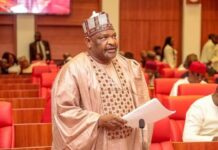By Ndidichukwu Odoh
The moment Abigail noticed her cough had been consistent and dry for one month, she visited Maitama General Hospital in Abuja, Nigeria’s Federal Capital to test for ‘cold’. She had assumed that the dry cough which makes her feel pains in her body was ‘minor infection’ the doctors could treat immediately.
Abigail was disappointed because her assumption was wrong, and she was jittery when the doctor told her she has to run a Tuberculosis (TB) test. Fear gripped her bones the moment the result was announced, “you are positive to tuberculosis”.
Testing Positive to TB is attached to many forms of discrimination; Nigerians are good at that, and thus, the reason why Abigail’s heart almost failed her. Her HIV test result says negative, she was a bit relieved with the HIV result, and there were glimpse of smiles on her face when the doctor told her the TB could be treated if she is consistent with her drugs.
It takes 6 weeks of commitment to treat TB with the first-line drugs-isoniazid and rifampicin, Abigail got her drugs without cost, took them for two weeks, she noticed the cough had stopped, she stopped taking them.
After two months, she began coughing intensely this time, there is complication, she did not use her drugs as prescribed, her body is now resistant to isoniazid and rifampicin.
Another test conducted concluded that Abigail has Multi-drug resistant TB (MDR-TB). This happened because she did not take her drugs as prescribed. Many people do not survive, Abigail was Lucky she made it alive, having being admitted at National Tuberculosis and Leprosy Control Program (NTBLCP) centers for treatment.
Narrating her experience at the just concluded 2019 National Tuberculosis Scientific Conference, Abigail has become an advocate for prevention. She committed to educate and sensitize Nigerians that beyond just TB infection, there is a more deadly disease behind when patients fail to take drugs as prescribed.
“I am a survivor, I was given a second chance to live, many people did not get it, I will plead with Nigerians to be more conscious of TB and committed to their treatment. My experience is bad and I won’t want more people to die because of TB” said Abigail who is now a healthy tailor in her community.
“test and treatment is available, there is no need staying and home infecting other people and dying in silence” she said.
World Wide, Tuberculosis (TB) is one of the top 10 causes of death and the leading killer from a single infectious agent (above HIV/AIDS). Millions of people continue to fall sick with TB each year.
Multi-drug resistant TB (MDR-TB) is the biggest worry. Drug-resistance TB continues to be a public health crisis. Worldwide, between 600,000 and 800,000 develop TB that is resistant to isoniazid and rifampicin, the most effective first line drug, and of these, 1 in 5 have multidrug-resistant TB (MDR-TB)
Three countries accounting for almost half of the world’s cases of MDR/RR-TB are India, China and the Russian Federation. Nigeria is rated No.1 TB affected country in Africa and 6th globally. Lagos state has the biggest TB burden in Nigeria. For Nigeria and most countries, ending the TB epidemic and major public health problems remains more of aspiration that reality.
Wife of Nigeria’s President, Aisha Buhari, at the 2019 Tuberculosis scientific conference is worried at the high rate of TC case detection and treatment. She says it “unacceptable that over 170,000 people die yearly from TB across the country”
Buhari is worried, just as Nigerians who live on the streets should be that “over 600,000 people become infected with TB in Nigeria every year, and up to 60,000 of these cases affect Children”
Nigeria has one of the lowest TB case detection rates in the world as it is currently detecting only 25% of TB cases with over 170,000 people dying from a preventable and curable disease.
Help for Nigeria: the United States Agency for International Development (USAID) has funded the building of a mobile application to help easy diagnosisi of TB by health worker and report to National Tuberculosis and Leprosy Control Program (NTBLCP)
The USAID intervention is implemented by the Sustaining Health Outcomes via Private Sector Plus (SHOPS PLUS), and is focused on overcoming the challenges of missing TB cases in the country.
“Nigeria is missing over 300,000 TB cases annually, because there are health workers who are not affiliated with the National TB program and tools to diagnose and report confirmed TB cases to government” said Dr Bolanle Faleye USAID/ SHOPS PLUS Technical Director.
The mobile app (TB STARR) according to him, can diagnose TB and notify the Federal Ministry of Health about confirmed cases through a web-based dashboard, which is free and available on google.























